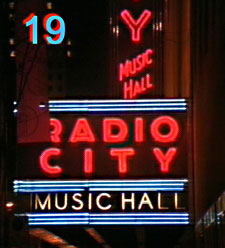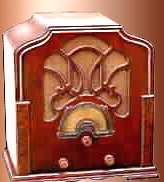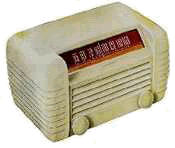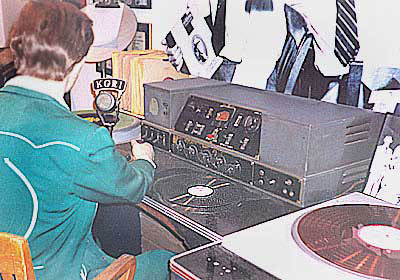Film, Radio and TV - 19 |
Regulations Despite the depression, as radio moved through the decade of the 30s, it was riding high on popularity. President Franklin D. Roosevelt, using an informal radio approach and bringing to bear his paternal, reassuring style, helped maintain confidence in conditions in the United States with his "fireside chats" from the White House. This was the first time radio had been used in this way. Roosevelt contributed something else to the history of broadcasting: the Federal Communications Commission (FCC). By 1934, radio and the electronic media were developing too rapidly for the original Federal Radio Commission's 1927 mandate.
Its purpose was to incorporate the powers of the FRC while expanding its mandate to regulate all of interstate electronic communications. When it comes to broadcasting, the FCC was (and is) the prime governing body. It's primarily responsible for issuing broadcast licenses (and occasionally suspending them for misconduct), for regulating station frequency, station power, and hours of operation, and for occasionally levying fines for broadcast content it deems objectionable. (Howard Stern and George Carlin, among others, found out first hand about this particular FCC power.) The FCC's prime directive is to see that broadcasting serves the public's "interest, convenience and necessity." However,
since FCC members are appointed rather than elected, decisions tend to reflect political
and business interests. |
Today, the FCC still governs broadcasting, although its governing board was officially reduced from seven to five members in 1983, and its powers have been diminished by various "deregulation" measures. In 1996, the FCC's areas of responsibility were further reduced with the passage of the Telecommunications Act. No history of radio would be complete without mentioning the famous (some would say "infamous") "War of the Worlds" broadcast in October, 1938. Orson Welles was a young, controversial genius of radio, stage and film. You may remember from an earlier module that he wrote, directed and starred in Citizen Cane, considered by many to be this country's most notable film. Among the many things he was involved in was a weekly network radio show called The Mercury Theater on the Air, which normally ran a distant second in the ratings to the "Charlie McCarthy" show on another network. Together with John Houseman (later to become a well-known actor) Welles, had come up with a radio drama for Halloween night involving an invasion from Mars. The show was in the form of a mock radio newscast featuring supposedly live reports from various parts of the United States tracing the destructive advance of the Martians across the country. It was clearly stated at the beginning of the show that it was only a drama (a Halloween spoof). However, people who tuned in after the show had started (during the time when "Charlie McCarthy" went into commercials), didn't hear the disclaimer. Keep in mind that this was during the time when "radio was king"; people were hearing about various international crises on the radio, and everyone was already a bit nervous about things in the country (the country was on the brink of a world war). Welles, who had showed up (as usual) minutes before the live, coast-to-coast broadcast, modified the script as he went along. He was working with a crack radio team used to his "flexible" style, so they adapted accordingly. The show included various realistic sound effects--all done "live," of course--that added believability. This included one that was created with the help of a nearby toilet. (If it worked, no one questioned it!) Some people who were listening were smart enough to tune to other radio stations, and finding no similar doomsday coverage, concluded that it was only a drama. A great many didn't, and the show caused panic across the country. People barricaded themselves in their homes with guns loaded; some people jumped in their cars and tried to flee the areas where the Martians were supposedly advancing; and many rushed to churches to settle things before it was too late. When these people later found out that the whole thing was a spoof, they were upset to the point of demanding legislative action. Cooler heads eventually prevailed, however. But, as a result, the name Orson Welles became famous and people became a bit more discerning about the content of broadcast programming.
Even though no restrictive government action resulted from the Halloween broadcast, government action has been taken against some more substantial threats to the public welfare. The sex-rejuvenation surgery and drugs promoted over the air by "Dr." John Brinkley caused him to lose his broadcast license. Among other problems, neither his exploits or supposed medical credentials found favor with the American Medical Association. But this issue pales in comparison to the fleecing that some rural U.S. listeners got from high-powered stations operating out of Mexico. By directionalizing their signals these stations could be heard at night throughout the United States. (Remember sky waves and ionosopheric refraction?) To help mask the fact that they weren't actually U.S. radio stations that must adhere to U.S. broadcast laws, the stations had you send your money to a Texas post office box near the Mexican boarder. One such station sold prayer handkerchiefs (no need to go to a doctor, they will cure any ailment) and 8x10 autographed photos of Jesus Christ. Unfortunately, the people who can least afford to part with their money--typically rural, uneducated people, living at the poverty level--end up being the most vulnerable to these exploits. Throughout the history of radio, a number of radio evangelists have run into problems with the FCC. These have generally been conservative fundamentalist preachers who regularly attacked certain groups or individuals without giving them the opportunity to defend themselves. Here are some examples. The Rev. Dr. Shuler's on-air accusations and fire-and-brimstone excesses caused his station to lose its license, and the Rev. Charles Couglin, who had major problems with certain organizations and minority groups, was also forced off the air. The Rev. Gene Scott, whose programming from Los One of the most noteworthy radio evangelists was the Rev. Carl McIntire who died on March 19th, 2002 at the age of 95. During his peak popularity, more than 600 U.S. and Canadian radio stations carried his weekly broadcasts, and yearly contributions from listeners totaled almost $4-million dollars. In his radio broadcasts the Rev. McIntire rallied against racial integration, Jews, Catholics, Communists, sex education, evolution, liberals, and water fluoridation. He attacked religious groups such as the World Council of Churches and denounced the popular radio and TV evangelist Oral Roberts as "a fraud and a fake." For many years the Rev. McIntire was a pastor of the Collingswood Bible Presbyterian Church in Collingswood, New Jersey. He also headed the International Council of Christian Churches, a fundamentalist coalition of churches. In 1970, the Federal Communications Commission took away McIntire's WXUR broadcast license where his weekly "20th Century Reformation Hour" radio program originated. McIntire was seen as "consistently violating the fairness doctrine." McIntire then tried to start an unlicensed (pirate) radio station on a boat off the coast of New Jersey, but the government soon put a stop to that illegal effort. In the next module we'll look at the next major development in radio--FM. |
The next interactive quiz will be after Module 22 To next module
To index © 1996 - 2005, All Rights Reserved.
|

 Roosevelt spurred Congress to pass the Communications Act of 1934, which set up a new governing body, the Federal Communications Commission.
Roosevelt spurred Congress to pass the Communications Act of 1934, which set up a new governing body, the Federal Communications Commission.

 Angeles is still regularly heard via TV, satellite, and short wave, has also had run-ins with the FCC.
Angeles is still regularly heard via TV, satellite, and short wave, has also had run-ins with the FCC.